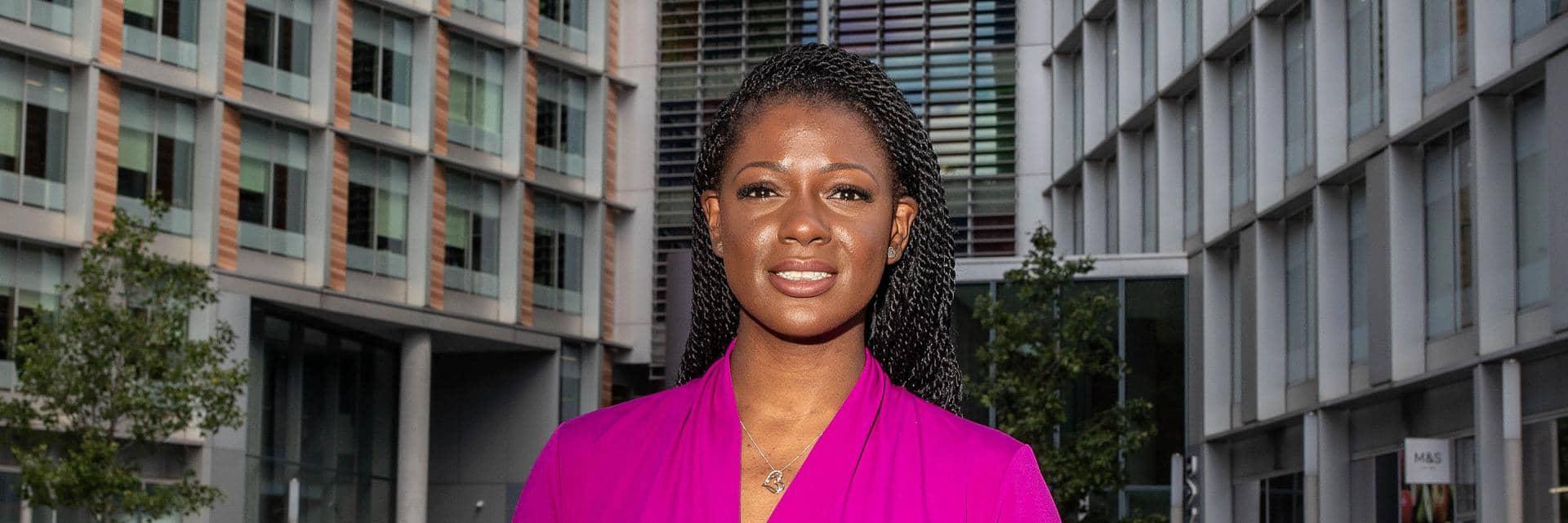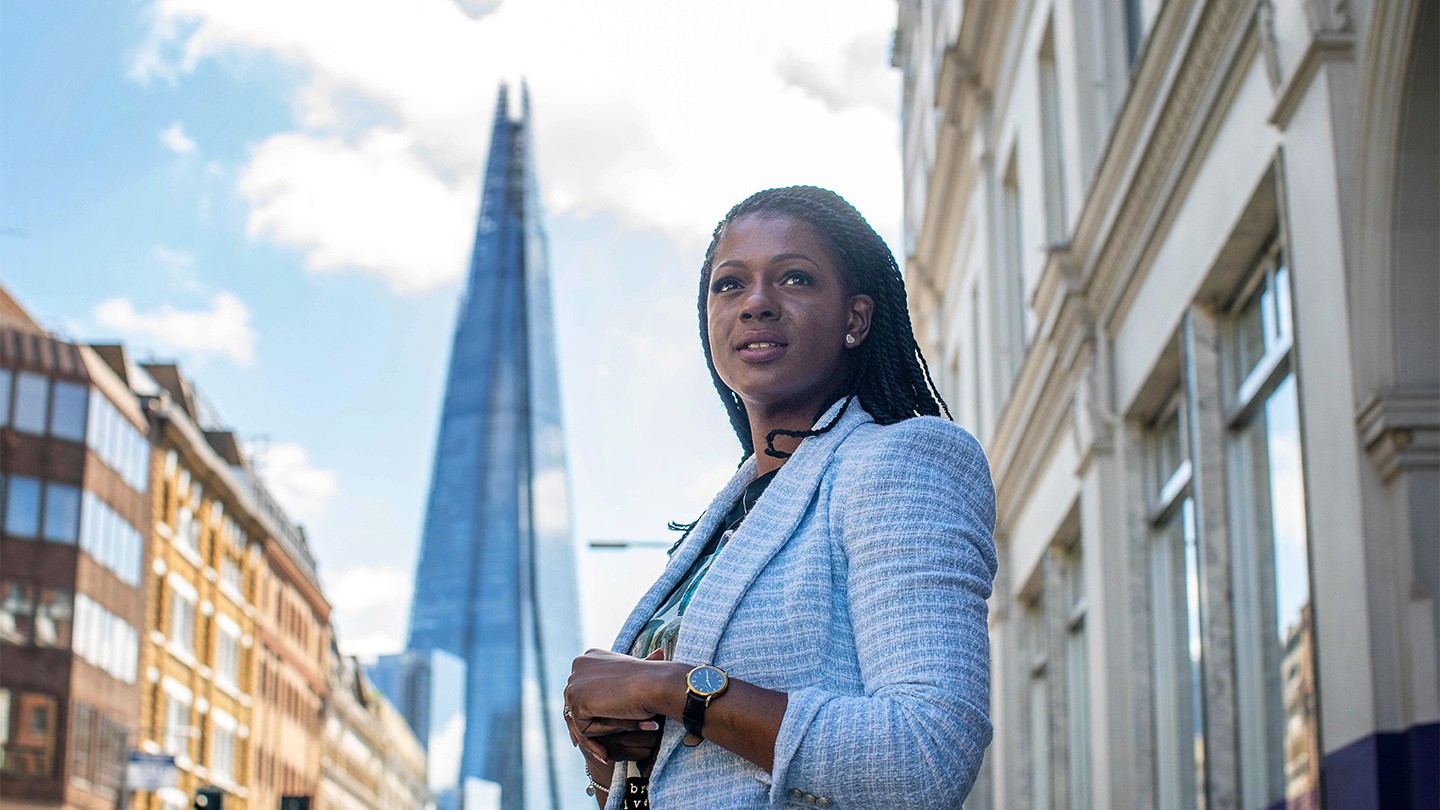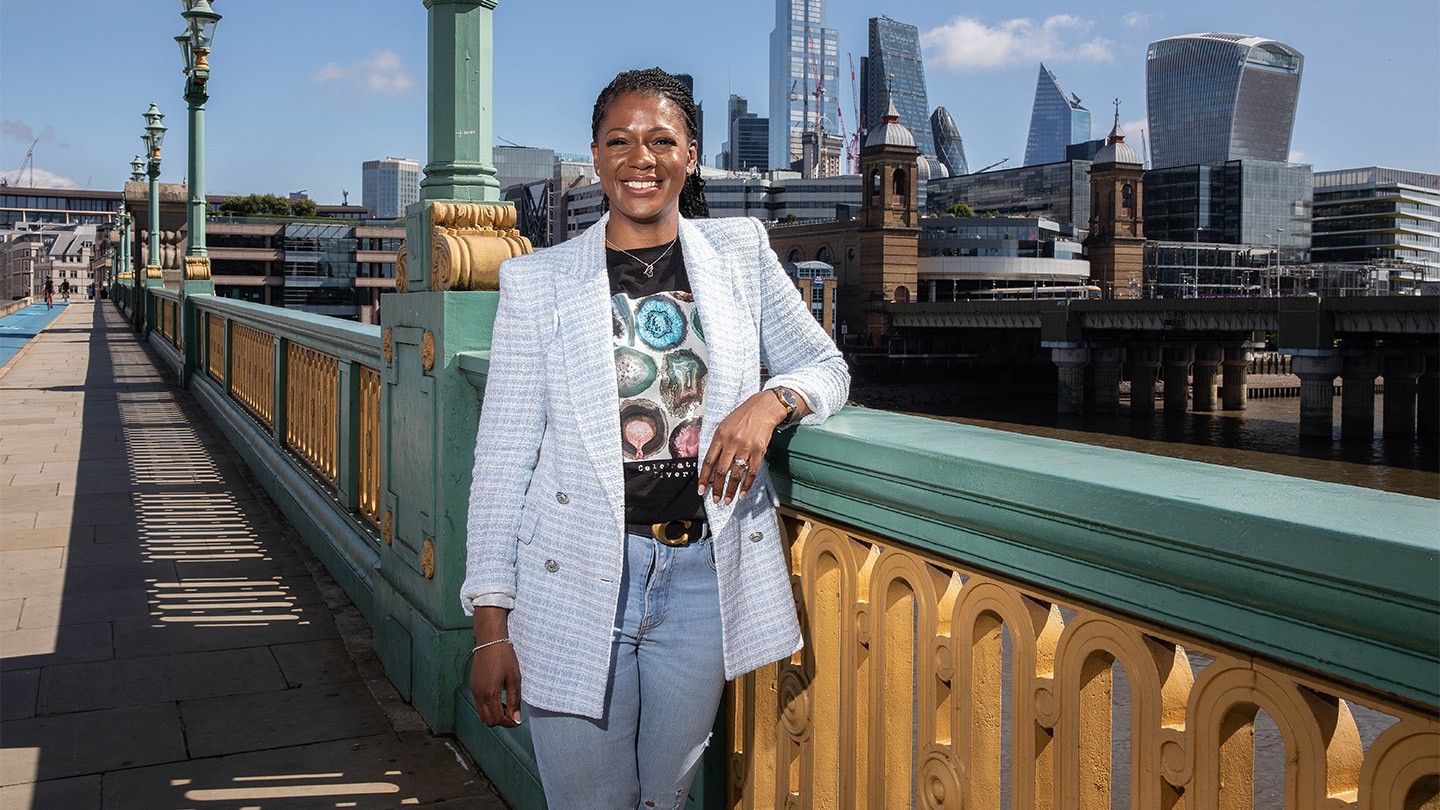
"I’d rather you embrace me for my differences"
15 November 2021
How can organisations create truly inclusive cultures? Hannah Awonuga, Global Head of Colleague Engagement, Diversity and Inclusion, shares her path to Barclays – and how the work she’s doing now on race, gender and socio-economic inclusion will help her “colleagues of the future”.
When Hannah Awonuga was a child, she looked from the windows of her family home in London Bridge and saw the skyscrapers of Canary Wharf a few miles to the east. Out on the streets, she watched professionals crossing the river to work in the city. “I knew then that, whatever I did in my career, I wanted the same look,” she says. “I knew I wanted to work in a bank.”
During the early days of a career that began 15 years ago, Hannah had to use her initiative to pick up the ‘rules of the game’. “I quickly realised that I wasn't going to go to college or school, but I knew that I wanted to get into work.” At just 16 and already living independently, she worked in a branch of another bank, before joining Barclays a year later.
“My first job in banking was as a cashier,” she adds. “I remember going to the interview in a tracksuit and a jumper because nobody had told me how to dress for the meeting. The lady saw my potential and invited me back to a second interview, but she suggested I get myself a white shirt and a pair of trousers. That little piece of advice was so helpful to someone in my position.”
Now, as Global Head of Colleague Engagement, Diversity and Inclusion at Barclays, Hannah’s work involves race, gender and socio-economic inclusion – which to her means amplifying the voices of the bank’s diverse workforce and really understanding how all colleagues can be included. “That could be the colleague in the Midlands who might be the only Black person on their team, or the LGBT+ colleague that doesn't feel that they can come out yet,” she explains. “Or it could be the senior leader from a different socio-economic background who might not feel able to share their story.”

Hannah Awonuga’s work as Global Head of Colleague Engagement, Diversity and Inclusion, focuses on race, gender and socio-economic inclusion.
When you see the cultural shift in the conversation, you know things are going in the right direction.
Global Head of Colleague Engagement, Diversity and Inclusion at Barclays
Hannah clearly remembers her own experiences during her early career in personal and business banking. “I was the youngest person in my team, and I was still looking around and thinking: ‘You don’t look like me, you don’t sound like me, you don’t come from the same background as me’.”
Since then, Hannah has made it her mission to be “a role model that people can look up to, so they can see colleagues who look like them in senior positions”. Winning a Rising Star award in the Banking and Capital Markets category from careers website WeAreTheCity has helped this visibility. “It was awesome to be recognised – not only for me, but for others to see.”
"We need to make sure we’re an option for people from every background”
A working mother with three children aged 13, nine and two, Hannah has also found the time outside Barclays to create Rarity London, a career development service for women. Her aim is help others understand their strengths, and map out how they can achieve ultimate job satisfaction throughout their careers.
“Rarity is a passion project,” Hannah explains. “I have always been passionate about supporting women with their career development – and this was my way of doing that. With my background, there were things in my career I had to learn myself because I had no one around me to help. But now that I’m in a better position in my career, I want to support women and help them in the early stages of their own journeys.”
Hannah’s work with her clients builds on lessons learned from her own role at Barclays, where she reports to the Group Chief Diversity Officer, Ray Dempsey. “As an organisation, we need to create the environment and the culture that allows people to thrive,” she says. “I never knew how to manage stakeholders or how to deliver a presentation – I was a girl from south London, with a bit of an accent, and I had to learn all of that.”
With her focus on socio-economic inclusion, Hannah describes her work at Barclays as truly intersectional. “It runs across race, gender and every social characteristic,” she says. “One of the key questions that organisations can ask their workforce is: ‘What did your parents do when you were 14?’ It isn't always about race or gender or sexual orientation. It can also be about your economic status and your background.”
This is crucial to attracting the best new talent to the business, Hannah adds. “We don’t want people to look at Barclays and think there’s no place for them here. We need to make sure we’re an option for people from every background, and ensure that all colleagues feel fully supported.
“It's about bringing stories together so that people can learn. And as you learn, you become more inclusive because you become more aware.”
I never knew how to manage stakeholders or how to deliver a presentation – I was a girl from south London, with a bit of an accent, and I had to learn all of that.
Global Head of Colleague Engagement, Diversity and Inclusion at Barclays

Hannah recently won a WeAreTheCity Rising Star award in the Banking and Capital Markets category.
Celebrating difference
Hannah knows that there is still a lot of work to do in the financial services sector, to address underrepresentation and accelerate progress towards a workforce that truly reflects the communities in which Barclays operates. But she hopes her work in the field, including programmes such as the Race at Work taskforce, will help her “colleagues of the future”.
“Some days, you wonder if societal inequality is just too big a tanker to move,” she reflects. “But there are days when you see the cultural shift in the conversation, and you know things are going in the right direction. In the last 12 months – after the murder of George Floyd and a greater realisation of the under-representation of the Black community across the world – people have been talking about diversity and inclusion a lot more, and seeing it in ways they haven’t before.”
Hannah has questioned the concept of a ‘colour-blind’ society she finds at other companies. “I speak to a lot of external organisations and they say: ‘We don't see colour. We want everyone to be themselves, regardless of gender or race’. But I've really challenged that notion, because actually I am a Black woman and I’d rather you notice me and embrace me for my differences, instead of trying to say everyone's the same.
“I’m a working mother, and I’m a Black woman, and it can be emotionally exhausting. Juggling a baby on my lap, being professional and being the voice of our Black colleagues has been demanding at times – but I absolutely love it.”